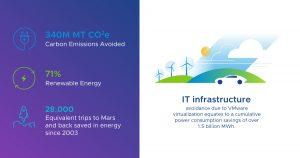Transforming the Telecom Network through Virtualization and Cloud Technologies

By Nicola Acutt, vice president, Environmental, Social and Governance (ESG)
When it comes to popular perceptions of environmental sustainability, big business can sometimes get a bad rap. It’s the biggest names in the industry—from Microsoft to Google to VMware—who’ve been leading the way in reimagining how big tech can create more sustainable operating models.
At VMware, we take this mission very seriously. Our success as a company—arguably, the whole reason we exist in the first place—is based on helping customers reduce energy consumption and waste. That is, after all, one of the core drivers for virtualization: the ability to support and grow your business while using less IT hardware.
Over the years, we’ve set ambitious targets for reducing greenhouse gas emissions, shifting to renewable energy, and conserving natural resources. We publish an annual Global Impact Report to track our progress. In many cases, these efforts have focused on enterprise virtualization. That work is important, and it’s worth taking a closer look at how these efforts translate to the service–provider space and will be able to impact the world’s communication networks in the coming years.
A Longstanding Commitment to Green Operations
Review the latest highlights of our sustainability efforts, and you’ll note the big, overarching goal we’re working towards: radically decarbonizing our supply chain, operations, and customer ecosystems by 2030. We have a long list of initiatives we’re working towards on this front, including cutting our emissions in half, improving the carbon efficiency of workloads, and fueling the transition to zero-carbon clouds.
The most impressive aspect of these efforts, however, is just how much progress we’ve already made. In November 2018, we officially achieved carbon neutrality—two years ahead of schedule. In 2019 (our fiscal year 2020), we cut our emissions intensity by 46% over the previous year, even as we grew total revenue by 12%.* We also now source 100% of the electricity for our global operations from renewable sources. In fact, Dow Jones just ranked VMware in the top 94th percentile in the software category for leadership in corporate sustainability.**
Our goals for 2020 were no less ambitious:
- Maintaining carbon neutrality and continuing to use 100% renewable energy across our operations
- Instituting aggressive water conservation in India and other water-stressed regions in our portfolio
- Achieving over 90% waste diversion globally and sending zero e-waste to landfills
- Procuring at least 50% of our business operations from suppliers who are committed to meeting the same kind of targets for sustainability and social responsibility
Building Transformative Products
The simplest way to reduce energy consumption in your digital footprint is also the most obvious one: run less hardware. As you might expect, this is an area where VMware excels. IDC estimated that from a cumulative standpoint, IT infrastructure avoidance due to VMware virtualization equates to power consumption savings of over 1.5 billion MWh and CO2 emissions avoidance of over 758 million metric tons from 2003 to 2019.***
Boosting Service Provider Efficiency
VMware technologies already translated to huge reductions in global energy consumption and greenhouse gas emissions. But until recently, most of this innovation was happening inside global enterprises. When it comes to some of the world’s biggest users of IT and network hardware—large national and regional communications service providers (CSPs)—the benefits of virtualization are just getting started.
CSPs provide the connectivity to power digital transformation. But inside their own vast networks—sprawling environments with thousands of sites running tens of thousands of devices 24/7—many have continued to rely on legacy infrastructure models. As a result, the industry hasn’t benefited from modern efficiency advances as much as enterprises have. In the last few years though, that status quo has started to change.
Today, CSPs are moving away from dedicated physical hardware in every part of the network and using virtualized network infrastructure instead.**** This allows them to deploy and upgrade services much more quickly. But, it also means that the same benefits of lower power usage and carbon emissions that enterprises have long enjoyed can now extend to CSP networks. That’s a huge deal, and it will have a huge impact on our environment.
Vodafone, for example, has been working with VMware to virtualize and “cloudify” their mobile and fixed broadband networks in 43 geographies around the world. In the UK, that work has already translated to a reduction of 100,000 MWh hours of energy consumption over the last three years and prevented 25,000 tons of CO2 from being released into the atmosphere.*****
5G Kicks Virtualization into High Gear
CSP virtualization has long been viewed as a “nice-to-have” capability. As mobile operators roll out 5G though, it becomes a core technology requirement as the automated delivery and scaling enabled by virtualization will be necessary to deliver the on-demand, customizable services expected of 5G, and beyond.
This evolution is kicking off a huge shift from legacy hardware to virtualized infrastructure in the world’s largest networks, and it will have a huge impact on global sustainability. One recent study conducted by Telefonica and Nokia, for example, forecasts that Telefonica’s new 5G network will spur a 90% reduction in energy usage compared to 4G.******
It’s not just CSPs’ internal operations that will get more efficient. In the coming years, CSPs and their partners will use 5G network capabilities to deliver a wide range of new services that enable cleaner, more efficient energy production and distribution. That includes things like:
- Predictive maintenance for energy generation, storage, and transmission infrastructure to improve efficiency and avoid failures
- Automated control of both renewable and conventional power generation equipment, using more sensors and artificial intelligence to maximize output
- Location-based battery supply systems to track demand for electric vehicle batteries and optimize supply and storage
- Intelligent energy demand/supply management applications that reduce and optimize energy consumption
- Smart grid load-balancing that uses real-time data and modeling to balance supply and demand across large-scale consumers and energy resources
These and other new 5G capabilities will help CSPs shake off the legacy hardware models of the past and become standard-bearers for a greener, more sustainable future. At VMware, we’re excited to play a key role in this transformation, and to enable some of the world’s most important, high-impact sustainability projects in the coming years.
For more information on the VMware 5G solutions visit: https://telco.vmware.com/

